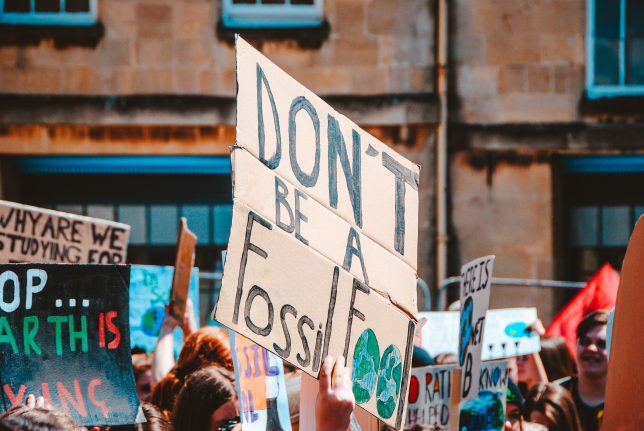
Fossil fuels have barely been mentioned in previous climate talks. COP26 has seen a shift, and new movements are forming.
By Catherine Early, The Ecologist (CC BY-ND 4.0).
A fight for the future of fossil fuels is underway at COP26 in Glasgow. On one side, the fossil fuel industry, whose lobbyists have been found to be more numerous than any single country’s delegates.
On the other, progressive countries vowing to phase out oil and gas, and campaigners urging for a fossil fuel non-proliferation treaty.
Draft texts of the final deal at Glasgow unveiled in the past couple of days have been interfered with by the hands of fossil fuel interests, who have “watered it down with weasel words,” said Cat Abreu, founder and executive of Canadian climate advisors Destination Zero.
Oil and gas
The first draft text released on Thursday morning called for governments to “accelerate the phasing-out of coal and subsidies for fossil fuels”, but this was amended in the second draft text to “accelerating the phaseout of unabated coal power and of inefficient subsidies for fossil fuels”.
This language has been used before, Abreu said, pointing to the example of the G20 group of nations, who pledged to phase out fossil fuel subsidies in 2009, but still have not done so.
“’Inefficient fossil fuel subsidies’ means nothing, and we’ve seen no progress on eliminating those subsidies since we’ve had that language,” she added.
Abreu noted that UN climate talks had never explicitly focused on fossil fuels up till now. “It’s as if we set up a system to deal with a pandemic and never mentioned what caused the virus!” she said.
However, other developments at COP26 have struck a blow at fossil fuels. On Thursday, Denmark and Costa Rica launched the Beyond Oil and Gas Alliance – the first time governments have led a move away from oil and gas production.
Unabated
France, Greenland, Ireland, Sweden, Wales and Quebec have joined the founder countries to commit to an end date for their oil and gas exploration and extraction, and curtail new licensing of oil and gas production. New Zealand and California have also pledged to take steps such as subsidy reform.
Though noticeably lacking large gas producers such as Russia and COP26 host the UK, climate campaigners were jubilant, calling it a gamechanger. “The launch of the Beyond Oil and Gas Alliance is a turning point. For far too long, climate negotiations have ignored the basic reality that keeping 1.5°C alive requires an equitable global plan to keep fossil fuels in the ground,” said Romain Ioualalen, global policy campaign manager at Oil Change International.
Coal, oil and gas are this generation’s mass weapons of mass destruction.
Speaking at the launch of BOGA at COP26, Danish climate minister Dan Jørgensen stressed that the launch was just the first step, and that it was urging other countries to join, with new signatories expected in the coming days. He also spoke of the need for a just transition, with retraining to be offered to workers in the sector.
The announcement on oil and gas followed a flurry of announcements at COP26 last week targeted at coal power. These included at least 23 new countries committing to phase out existing coal power, including Vietnam and Poland, who also committed to building no new coal plants.
Some 25 countries have signed up to ending international government funding for unabated fossil fuel energy by the end of 2022. Nearly 30 new countries signed up to the Powering Past Coal Alliance, including Chile and Singapore, bringing the total membership to 188 countries, sub-national governments and businesses.
Consumption
Analysis by the Centre for Research on Energy and Clean Air (CREA) published on Friday found that pledges made at and in the run-up to COP26 have had an “unprecedentedly large and direct” impact on coal-fired power generation. This includes 370 more coal plants generating 290GW given a close-by date, the likely cancellation of 90 new coal power projects (totalling 88GW); and a further 130 new projects totally 165GW called into question.
Lauri Myllyvirta, lead analyst at CREA pointed out that 95% of the world’s coal power plants are now covered by carbon neutrality targets, which cannot be met without closing essentially all of the coal fired power plants.
However, Abreu pointed out that some governments had signed these initiatives while continuing to pour millions of dollars into coal power in their own countries. A report published November 13, 2021 by a group of NGOs including Stand.earth and Greenpeace pointed out that the UK, US, Canada, Norway and Australia are all planning to approve and subsidise new fossil fuel projects, undermining their recent claims of leadership in addressing the climate crisis.
Despite their net zero targets and climate pledges these five nations alone have provided over $150 billion in public support for the fossil fuel production and consumption during the COVID-19 pandemic, the report found. This level of support to fossil fuel production is more than the entire G7 put towards clean energy as part of the pandemic recovery ($147 billion).
Protagonists
During COP26, the European Commission proposed plans to subsidise new fossil gas pipelines, terminals and storage facilities which could import gas that would emit more carbon than Austria and Denmark combined, according to analysis by Global Witness.
Meanwhile, youth activists Fridays for the Future have called for governments to sign a fossil fuel non-proliferation treaty, joining a movement that now includes more than 120 nationally-elected parliamentarians from 25 countries including Indonesia, the Philippines and Pakistan, more than 2000 scientists, over 700 civil society organisations and indigenous peoples.
Fossil fuel production must decline by roughly 50% by 2030 to keep average global temperature rise within 1.5C from pre-industrial times, according to a report by the UN Environment Programme, while the International Energy Agency has said that expansion of fossil fuels is incompatible with the target.
The campaign is based on other global campaigns including the Treaty on the Prohibition of Nuclear Weapons, the Anti-personnel Landmine Convention and the Montreal Protocol on ozone-depleting substances, all of which provide a model towards a treaty to abandon fossil fuels, its protagonists believe.
Burning
The treaty proposed by campaigners would bring about an immediate end to the expansion of all new coal, oil and gas production; a fair phase out of existing fossil fuel production and a just transition for workers and communities dependent on jobs in the industry so that they can diversify their economies.
A letter signed by young people from 20 countries in support of the treaty complained that their participation in climate conferences had been tokenised, while that of fossil fuel interests had been supported.
Speaking at a press conference with Fridays for the Future at COP26, Brenna Two Bears said: “Coal, oil and gas are this generation’s mass weapons of mass destruction.
“We are doing this because of the wilful ignorance of our leaders, and their predominant fixation on profit and economic growth. Young people are not just inheriting a burning, flooding, melting planet, we are already living in it,” she said.
Catherine Early is chief reporter for The Ecologist and a freelance environmental journalist. She tweets at @Cat_Early76.

